“What Would Sybil Say?” A POW’s Story of Love, Loyalty, and Survival
When asked what kept him going during his nearly three years as a Korean War POW, William "Bill" Funchess, 91, gives credit to his physical and mental toughness growing up as a "South Carolina farm boy;" his strong Christian faith; and his wife, Sybil.
Reminiscing about “the most wonderful girl in the world," Funchess said in a recent phone interview, "The entire time I was a prisoner, everything I did centered on the question, 'What would Sybil say? What would Sybil want me to do?'"
"She was always uppermost in my mind," he told me as he talked about his wife of nearly 68 years. "I was determined to get home to see her."
But Funchess, a US Army 1st Lieutenant with Company C, 19th Infantry Regiment, 24th Infantry Division, would be forced to wait 34 months - and endure an unimaginable nightmare - before they would reunite.
A Living Hell
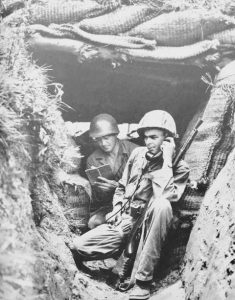
Lt. Funchess talks to headquarters from his dugout on the Kum River, July, 1950. (PC: US Army)
Captured on November 4, 1950, after his unit was overrun and wiped out by overwhelming Chinese forces, Lt. Funchess was marched to POW Camp #5, one of the most notorious and brutal prisons in North Korea.
During their time at the inhumane camp, prisoners slowly died from lack of food and water, disease, and constant exposure to the elements. Some men, physically exhausted and totally overcome by the severe hardships, became crazed and lost the will to live. The death toll was staggering.
But despite an untreated bullet wound to his foot, complications from hepatitis, and severe malnutrition, the 23-year-old lieutenant who had been raised on a Depression-era farm in Orangeburg County, South Carolina, refused to give up.
“I thought about Sybil constantly,” he recalled. "And I prayed."
The Chaplain From Kansas
Using the palm-sized Bible that he had smuggled into the prison and kept carefully hidden from the Chinese, he read scripture verses, prayed, and secretly spent time with his fellow Americans in worship.
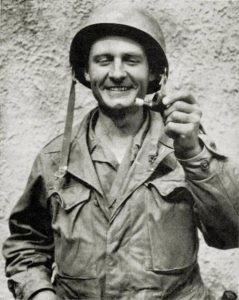
Chaplain Emil Kapaun, 8th Cavalry Regiment, before being captured on November 2, 1950. (PC: US Army)
One of the prisoners who frequently joined him was Father Emil Kapaun, a US Army Chaplain and Catholic priest. "He was from a farm in Pilsen, Kansas, so we had a lot in common," Funchess told a Clemson University magazine reporter.
Kapaun, respected and admired throughout the compound for his unwavering dedication to his Faith and fellow prisoners, became a pillar of strength and support for the American soldiers.
“Father Kapaun was very active. He took a lot of risks going from shack to shack," Funchess remembers. "He picked lice off the sick and dying, bandaged their wounds, cleaned their soiled clothes, and fed them stolen food from the Chinese guards."
But the Chinese noticed Kapaun’s selfless actions and soon despised the man they believed was undermining their authority. "They resented him and hated what he was doing," Funchess recalled.
When Kapaun, suffering from a blood clot in his leg, became too weak to walk or take care of himself, Funchess stepped in.
No Greater Love
“It was like taking care of a baby,” the former army officer said during his Clemson interview. “I had to spoon feed him. When he got cold and shivering, I’d wrap my arms around him.”
But as Kapaun's condition worsened, the Chinese moved him to a nearby “hospital,” referred to by the Americans as the "death house” because few men made it out alive.
Within days of entering the abandoned Buddhist monastery that the Chinese claimed was a medical facility, Kapaun was dead. His emaciated body was never recovered.
The men at the camp were devastated.
Funchess, heartbroken at the news, did his best to carry on. "The only time I broke down emotionally during my entire time in captivity,” he recalled, "is when I was told that my father, only 51 years old at the time, had died."
"I went off by myself and cried for 10 or 15 minutes,” Funchess remembered, "and then I stopped.” With every day a struggle to survive, the lieutenant, once again, pushed on. "I thought, 'I've got to worry about living, about surviving this ordeal."
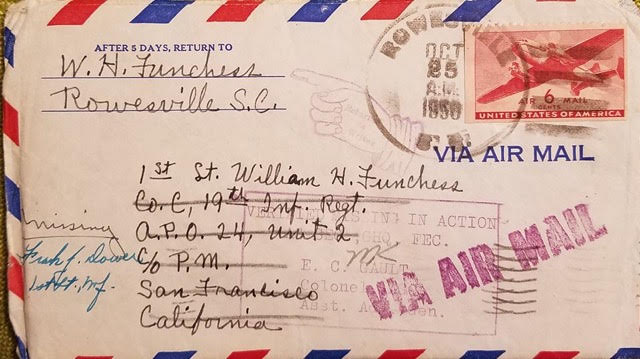
The first and last letter Bill’s father wrote to his son. The letter was returned to the family with the stamp (barely visible) MISSING IN ACTION. The father died six months later at the age of 51. (PC: William Funchess)
“The Happiest Moment Of My Life”
On September 6, 1953, after 1,038 days in captivity, Funchess was released. He crossed the DMZ, was picked up by a waiting US Army ambulance, and was soon eating his first good meal in years.
Weeks later when he limped off a plane in Columbia, South Carolina, to more than 100 family members, friends, and adoring citizens who had read his story, he saw only one person.
“I saw Sybil, wearing a bright red dress and waving frantically," he said with a slight break in his voice. Seconds later, the moment he’d been waiting for since the summer of 1951 occurred.
Lt. Funchess and his wife ran into each other’s arms and embraced for the first time in over three years.
“I hugged her and I just held on, I just held on to her, and it was the happiest moment of my life,” he recalled. After what seemed like minutes of silence, he added, “It was unbelievable, I cannot put it into words.”
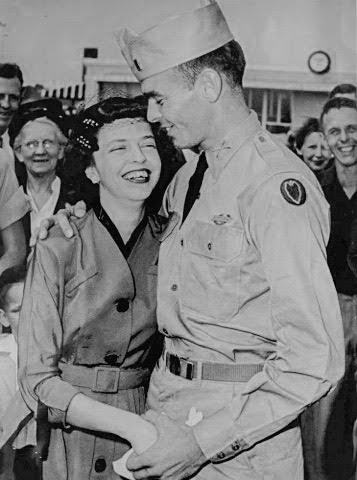
Bill and Sybil Funchess embrace for the first time in more than three years. “It was the happiest moment of my life,” Bill said. (PC: William Funchess)
Postscript
Bill Funchess left the Army, returned to Clemson University, earned a master’s degree in agronomy, and spent the next 30 years working for Clemson Extension Service.
Bill and Sybil had three children and were married for nearly 68 years. Sybil passed away on May 25, 2017. The former Army officer still lives in his home in Clemson, SC.
Despite his aches, pains, and ailments from his time as a POW, he is still physically and mentally strong. “I’m looking forward to many more good years,” he said during our interview.
A devoted Clemson football fan, he attended his last game four years ago, where he was recognized as the "Hero of the Game." They were playing Notre Dame.
Father Kapaun was named a Servant of God by the Catholic Church in 1993 and was posthumously awarded the Medal of Honor in 2013.
On September 20, 2019, National POW/MIA Recognition Day, we pay tribute to Lt. Funchess, Fr. Kapaun, and all the brave American POWs throughout our history. We also honor the more than 7,500 men still missing in action from the Korean War and the 83,000+ men from all our wars who have yet to come home.
As Lt. Funchess said in his interview, this is a day "all Americans should take a minute and remember the sacrifices of those who were captured and killed in Korea."
Lest we forget.
Acknowledgement: The author would like to thank Bill Funchess for sharing his story and pictures; John Stansifer (@ No Bullet Got Me Yet: Father Kapaun in the Korean War) for the wealth of information he provided on Father Kapaun; and Ken Scar at Clemson University Media Relations for his excellent pictures and article, “The Unbreakable Tiger.”
Top/Feature picture: A Chinese propaganda photo of Funchess (second from right) and his fellow prisoners (PC: Frank Noel via The Unbreakable Tiger. )
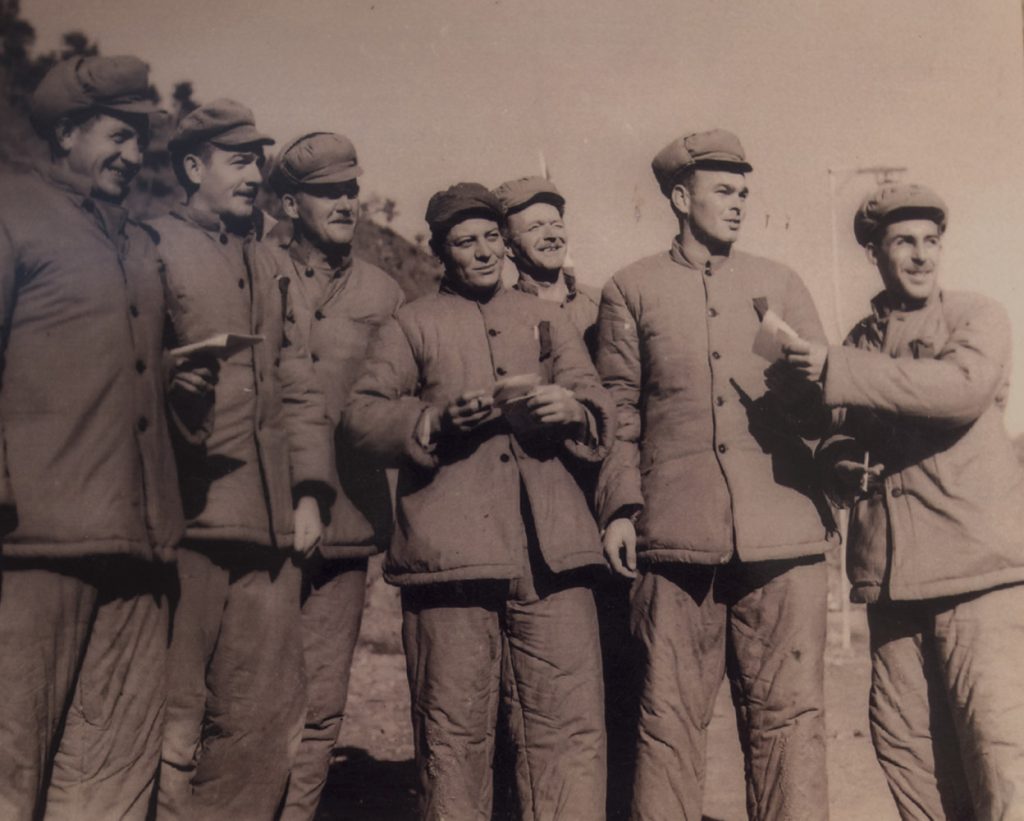
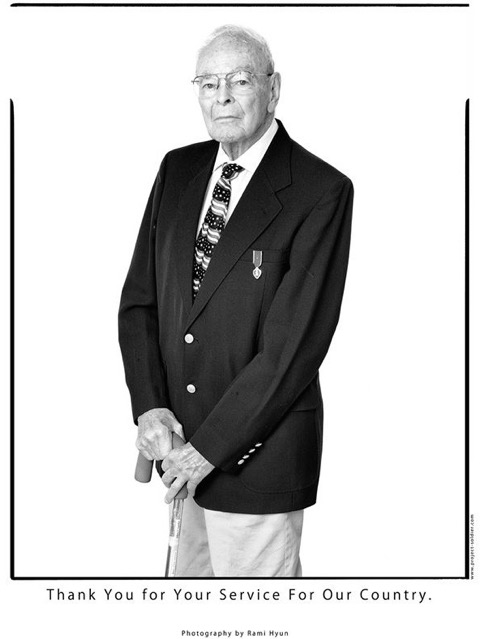
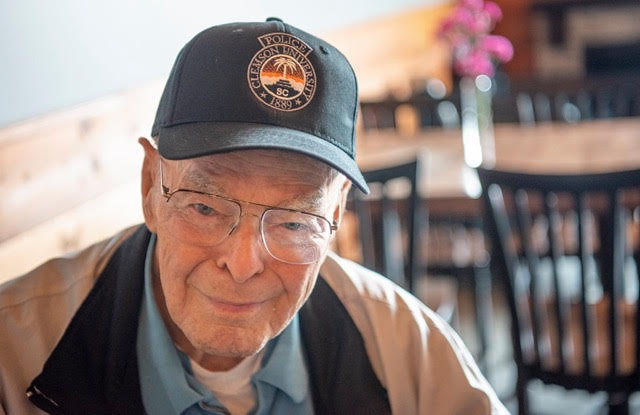
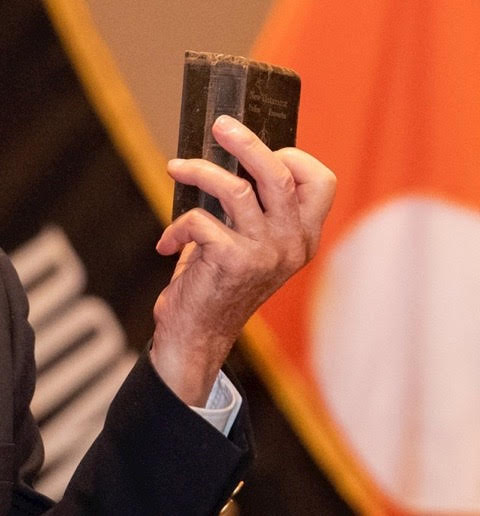
hi.. after hearing about william funchess through a church sermon, i was greatly moved at the thought of the sacrifice he made for our country but sadden at the loss of his father and his time as POW..but than happy at the time he came home to be with his wife and mother…
All the suffering he went through makes me appreciate the freedom we so much enjoy. Men like Mr. Funchess should never be forgotten, for its men like him that make it possible for us to wake up feeling safe… Thank you Mr. Funchess for your time in service. I wish i could have met you. A special thank you to his family and close friends for being there for Mr. Frunchess… May you rest in peace with our god the father…
Thanks for reading the post and taking the time to comment, Rosemary. Mr. Funchess has an amazing story, and we’re glad to hear that it’s being shared in church sermons. We owe him and all our Korean War veterans so much!
Just to clarify, he is still alive and lives in SC. It was a real honor for us to speak with him before writing this story.
Again, thank you!